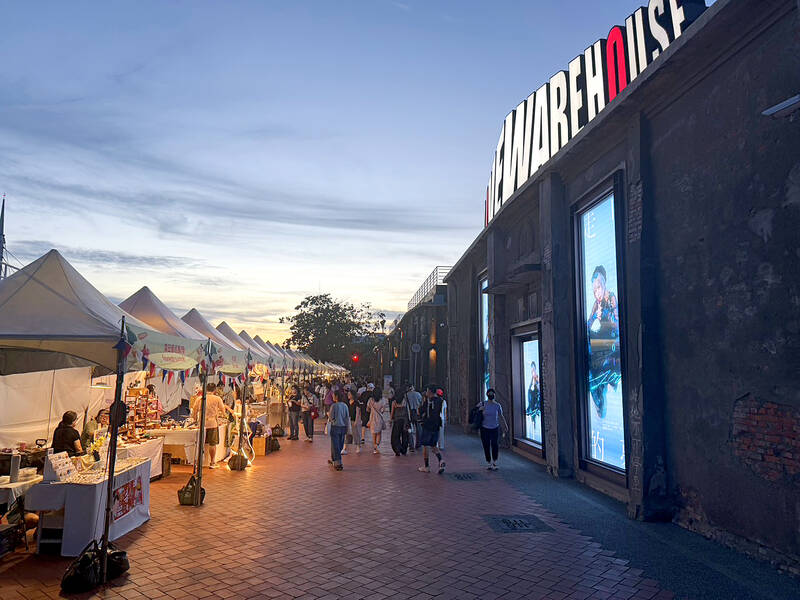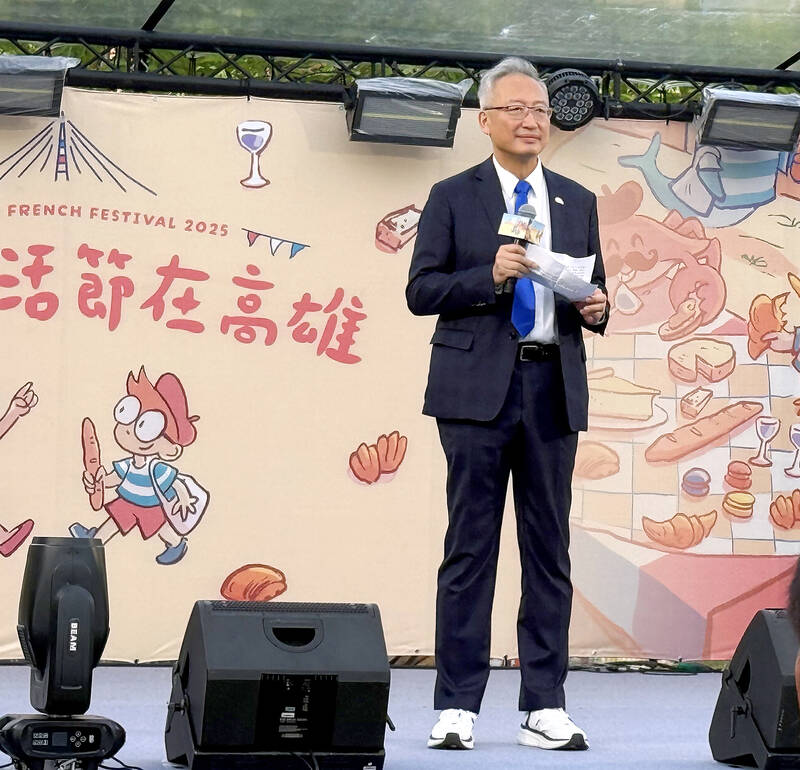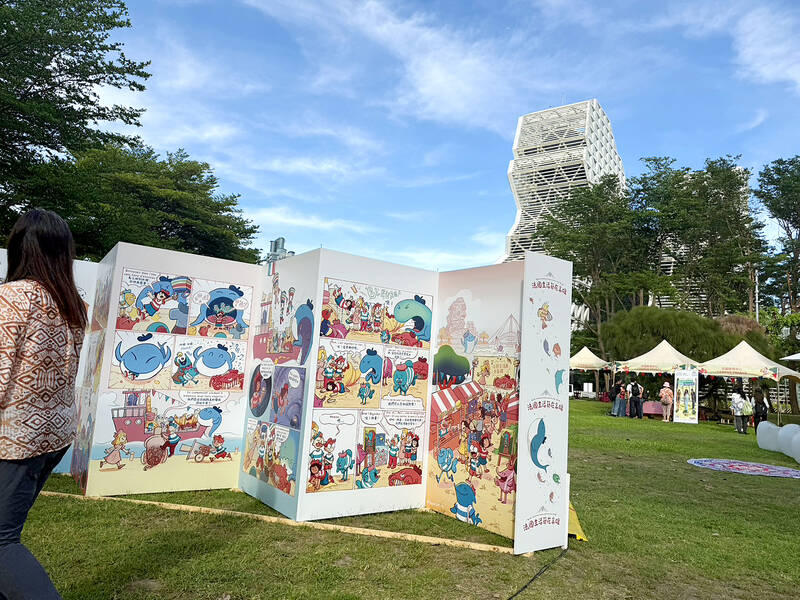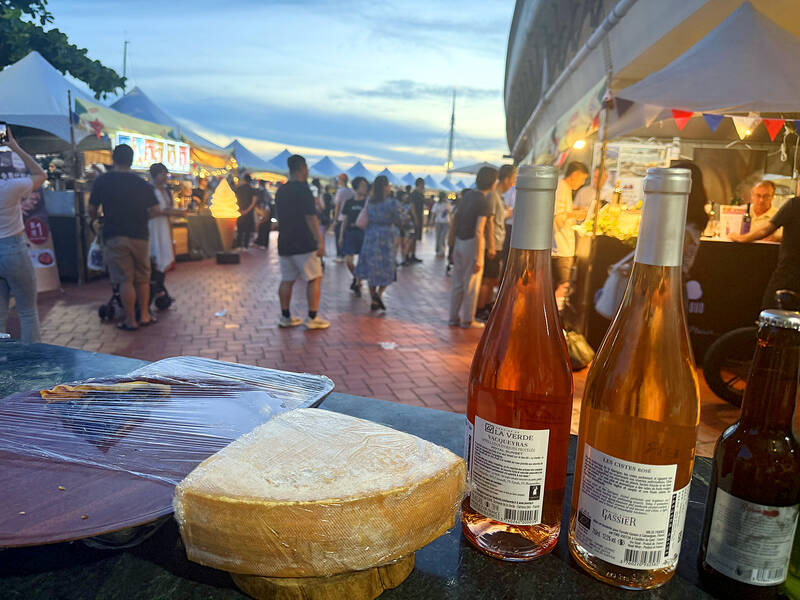Francois Wu (吳志中) is impossible to miss in a crowd.
Tall and striking, pairing white tennis shoes with a suit, the Deputy Minister of Foreign Affairs is at the French Festival here in Kaohsiung.
Last year, when he attended the inaugural event, he was still Taiwan’s ambassador to France.

Photo: Julien Oeuillet
“Taiwan, if you look at it very closely, is a very diverse society,” he says, “and so is France.”
Wu is probably the only Taiwanese person who speaks English with a French accent — but what he says resonates with the French community at the festival.
Dozens of booths line the festival grounds, showcasing French products from small importers and large companies alike, as well as small French-owned businesses in Taiwan. Artisanal crafts, organic beauty brands, and of course, food and wine abound.

Photo: Julien Oeuillet
And the French residents of south Taiwan happily echo the minister’s sentiment.
‘REAL FRENCH PEOPLE’
Pierre, who owns a Mediterranean restaurant in Kaohsiung, says: “I think people might have an image of France which is very far from the reality. So here they can meet real French people and see what’s going on in France, not just the Eiffel Tower.”

Photo: Julien Oeuillet
Stephane, a wine importer based in Tainan, adds: “It’s good to do it out of Taipei, it’s the same about France: it’s not always Paris.”
The comparison between Kaohsiung and Southern France is striking — no surprise that this year’s festival focuses on the Cote d’Azur, following last year’s spotlight on Provence. These are southern, coastal, provincial regions that flourish outside the shadow of their national capitals.
Heidi Chang (張硯卿), director of International Affairs for Kaohsiung City, has been the festival’s driving force from the start.

Photo: Julien Oeuillet
“Last year’s success proved that the people of Kaohsiung really value this kind of international dialogue,” she says. “The festival has grown in both size and depth. We’ve added new elements like a French artist-in-residence, immersive ocean-themed VR experiences, outdoor talks and more performances and culinary experiences. It also ties in with the UN Ocean Conference in Nice, highlighting ocean sustainability.”
Last year’s edition exceeded expectations. This year, the booths are even fuller and more numerous.
But Chang says her hope was always “that the festival becomes a platform for real cultural connection — where people can experience French culture up close, and where Taiwan-France relations grow stronger through face-to-face interaction... It’s not only about enjoying art, food, and music, but also about deepening mutual understanding. In the context of city diplomacy, events like this help bring international friendship into everyday life.”
DIPLOMACY ROOTED IN CULTURE
Kaohsiung is showing what more Taiwanese cities could do: grassroots diplomacy rooted in culture. While the central government is constrained by its lack of formal diplomatic ties, cities have more room to maneuver — reaching out to communities abroad while bypassing national-level negotiations.
“We wanted something beyond formal visits,” Chang says, “something that brings both cultures together in a fun, vibrant, and accessible way.... While the content has expanded, the core goal remains the same: to build lasting, people-to-people ties between Taiwan and France through culture.”
What the festival reveals is a city engaging with countries beyond the two superpowers.
“For the past nine years, since 2016, I think the image of Taiwan has been significantly improved in Europe,” says Francois Wu. “Taiwan, in some way, is a kind of middle power, and it’s very similar to most European Union members. In terms of population, we are the same as the Netherlands, on terms of territory, we are very similar to Belgium... And at the same time, we are all very successful with limited resources, and free countries.”

Jacques Poissant’s suffering stopped the day he asked his daughter if it would be “cowardly to ask to be helped to die.” The retired Canadian insurance adviser was 93, and “was wasting away” after a long battle with prostate cancer. “He no longer had any zest for life,” Josee Poissant said. Last year her mother made the same choice at 96 when she realized she would not be getting out of hospital. She died surrounded by her children and their partners listening to the music she loved. “She was at peace. She sang until she went to sleep.” Josee Poissant remembers it as a beautiful

March 2 to March 8 Gunfire rang out along the shore of the frontline island of Lieyu (烈嶼) on a foggy afternoon on March 7, 1987. By the time it was over, about 20 unarmed Vietnamese refugees — men, women, elderly and children — were dead. They were hastily buried, followed by decades of silence. Months later, opposition politicians and journalists tried to uncover what had happened, but conflicting accounts only deepened the confusion. One version suggested that government troops had mistakenly killed their own operatives attempting to return home from Vietnam. The military maintained that the

Before the last section of the round-the-island railway was electrified, one old blue train still chugged back and forth between Pingtung County’s Fangliao (枋寮) and Taitung (台東) stations once a day. It was so slow, was so hot (it had no air conditioning) and covered such a short distance, that the low fare still failed to attract many riders. This relic of the past was finally retired when the South Link Line was fully electrified on Dec. 23, 2020. A wave of nostalgia surrounded the termination of the Ordinary Train service, as these train carriages had been in use for decades

Lori Sepich smoked for years and sometimes skipped taking her blood pressure medicine. But she never thought she’d have a heart attack. The possibility “just wasn’t registering with me,” said the 64-year-old from Memphis, Tennessee, who suffered two of them 13 years apart. She’s far from alone. More than 60 million women in the US live with cardiovascular disease, which includes heart disease as well as stroke, heart failure and atrial fibrillation. And despite the myth that heart attacks mostly strike men, women are vulnerable too. Overall in the US, 1 in 5 women dies of cardiovascular disease each year, 37,000 of them